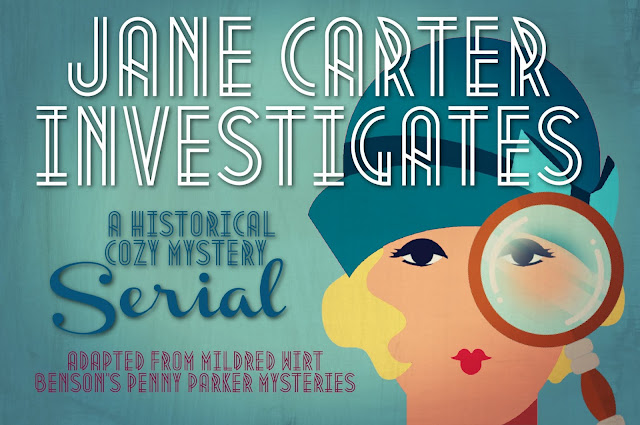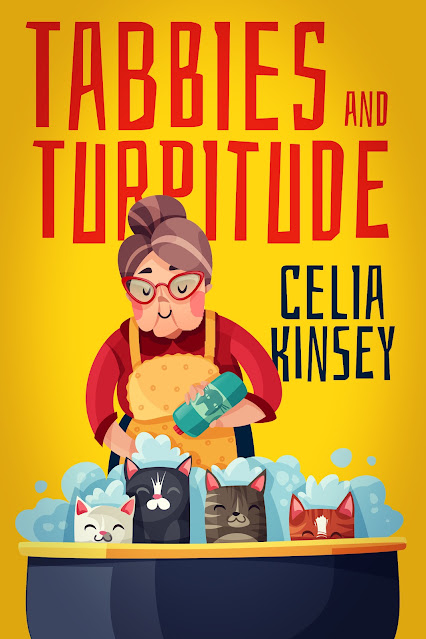Jane Carter Investigates Episode One-Hundred and Thirty-Three
I had never found it necessary to
explain fully to my father what had become of Mrs. Timms. I had mentioned
rather carelessly that the housekeeper was helping at the Firth home for a few
days, and Dad had accepted the substitution of Rosie Larkin without too many
questions, although I could see he wanted to ask far more than he did.
I wondered if I had not been as
stealthy as I had imagined on the night I had observed my father and Mrs. Timms
locked in embrace on the davenport. Perhaps they now suspected that I knew
about their clandestine romance but were uncertain how to address the delicate
subject. It was useless to speculate on how long they’d been gathering rosebuds
behind my back. I would endeavor to be
patient and allow them to reveal their secret when they were ready.
Unfortunately, there was a serious problem with this waiting-it-out strategy:
patience is not my greatest virtue.
At breakfast on Wednesday morning, Dad
waited until Rosie had gone to the kitchen and then demanded: “How much longer
is this to continue? When is Mrs. Timms coming home?”
“Friday morning, Dad. Don’t you like
Rosie’s cooking?”
“It’s awful,” he whispered. “These eggs
taste as if they had been fried in lard.”
“They were,” I said. “Rosie was brought
up to be frugal. She never wastes butter.”
The discussion was brought to an abrupt
end by the appearance of Rosie. My father immediately switched to another
subject, that of a barbecue picnic which he gave each summer to the Examiner
employees. I had forgotten that the outing was scheduled for that evening
at the cottage.
“I’m glad you reminded me, Dad,” I
said. “I’ll be there with bells on to eat my share of roast beef. Mind if I
bring Harry Horner?”
“Invite him if you like,” Mr. Carter
said. “But no others. This is a newspaper picnic, not a bread line as you made
it last year.”
I worked as usual at the Press building on getting out the next
issue of Carter’s All-Story Weekly. I
was busy figuring advertising space when I found myself in need of an extra
sheet of paper. I had run out, and I didn’t want to bother going down to Flo’s
office in search of more, so I tried to open the lower drawer of my desk where
I thought I’d seen a few pieces.
The drawer was stuck fast. I tugged at
it several times, finally pulling it out entirely. A folded newspaper clipping
dropped to the floor.
The clipping was yellow with age and
bore the picture of a young man. The face was vaguely familiar, although the
name beneath it read Marcus Jewel.
But it wasn’t Marcus Jewel. It was
Marcus Roberts as a young man. He must have changed his name. He looked very
much the same, just older.
The two-column headline read: MARCUS
JEWEL BEGINS TEN YEAR SENTENCE IN NEW YORK STATE PRISON FOR MISAPPROPRIATION OF
BANK FUNDS
The clipping had been cut from a New
York City paper and was dated twenty years earlier. It reported Marcus Jewel’s
conviction, following an admission that he had stolen two thousand dollars belonging
to the Berkley Savings Bank.
I studied the picture again. I had not
the slightest doubt that the young man of the story and Marcus Roberts were the
same individual. Evidently the clipping had been saved by the former publisher,
and in some manner had become lodged beneath the drawer and left behind.
I was sure no one in Greenville knew
that Roberts served a term in prison. He’d moved to Greenville years ago with
his daughter and, to all appearances, had led an upright life. I returned the clipping to the drawer and
locked it.
I was now almost certain why Roberts
was being blackmailed, but why should he ruin his career rather than face
exposure? Other men made mistakes in their youth and started over again. His
misdeed had happened so long ago. If the truth were to come out, it would
undoubtedly humiliate him, but it would certainly not ruin him.
I gathered together my belongings and
went in search of Harry and invited him to attend the picnic.
“Thank you mightily,” said the
pressman, “but I’m not dressed for it. These pants are so shiny you could use
’em for a mirror.”
“Don’t you worry about your clothes,
Harry. Besides, it will be so dark no one will notice. Dad gave you a special
invitation.”
“Did he, now? Well, if you think he
really wants me, maybe I’ll go.”
“You wash up while I get the car,” I
urged. “We’re rather late.”
Within ten minutes, Harry met me at the
front entrance. His hair was combed, he wore a frayed coat and had contrived to
polish his shoes.
“Mr. Horner,” I said as we drove toward
the river road, “did you ever hear that Marcus Roberts had been in trouble
before he gave up his paper?”
“You mean financial?”
“No, I meant something of a more
personal nature. I’ve been thinking over your theory that Roberts was
blackmailed.”
“Maybe I oughtn’t to have said what I
did. It was just my own idea.”
“I’m inclined to believe there may be
something to it. Now supposing that Roberts had stolen money or had been in
prison—”
“It couldn’t have been that,” Harry
insisted. “Roberts was so honest he bent over backward to avoid even the
appearance of any wrongdoing.”
I was tempted to tell Harry about the
clipping but decided not to. It was clear that the employees of the Morning
Press had never had the slightest
inkling of Mr. Roberts’s prison record.
The picnic was well underway by the
time Harry and I arrived at the river cottage. A caterer had taken complete
charge, and, with his crew of helpers, prepared to serve nearly two hundred
boisterous, hungry newspaper employees.
My father was making his annual speech
of appreciation to his staff, and, as I stood listening to him, Jack Bancroft
came up beside me.
“We don’t want to hear any speeches,”
Jack said. “Let’s go look at the moon.”
“Can’t we see the moon from here?” I
asked. “I certainly seem to be able to see it perfectly well.”
“A moon, to be appreciated properly,
must be seen from a sandy beach. Preferably from a nice comfortable shoulder.”
“Oh, alright,” I said, remembering my
promise to Mrs. Timms, “but don’t count on any shoulders becoming involved.”
I did not say, “Don’t you dare even
think about trying again to kiss me, Jack Bancroft,” but I wanted to.
I raced ahead of Jack, along the beach
to the suspension bridge. I was halfway across when he overtook me, rocking it
so violently that I had to cling to him for support.
“Stop that, Jack Bancroft! You’ll break
the bridge!”
“Then don’t try to run away from me.
Will you let me show you the moon?”
“No, I know you, Jack. You say that to
all the girls.”
“If I do, it’s just as a rehearsal.
I’ve hoped that someday I might get a chance to show it to you.”
“What a line you have,” I said. “But I
won’t play. As a moon-shower your technique is terrible. Better practice some
more.”
Jack chuckled, slipped his hand into
mine, and led me on across the bridge.
“If you won’t look at the moon,” he
said, “then take a squint at Old Man River.”
“I believe I prefer the moon, after
all,” I said as I raised my eyes to the disc of light sailing serenely through
the star-pricked sky. “It is beautiful.”
My reverie was broken by Jack’s voice.
His hand tightened on mine.
“Jane! Look over there!”
On the river bank, I saw the forms of
two struggling men silhouetted in the moonlight.
“Oh, Jack, they’re fighting!”
“To the death,” said Jack grimly. “Come
on, before it’s too late!”



Comments
Post a Comment